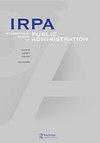韩国国会的预算政治:谁从立法预算中得到了什么?
International Review of Public Administration
Pub Date : 2023-07-03
DOI:10.1080/12294659.2023.2256100
引用次数: 0
摘要
ABSTRACT 本文试图通过研究我们所说的立法预算来揭示韩国国会的预算政治。为便于分析,立法预算被定义为预算和决算特别委员会全面审查阶段增加或新增的预算。利用 2012 财年至 2015 财年的预算审查报告,我们分析了谁从立法预算中受益,以及立法预算优先考虑哪些类型的政策和预算。结果表明,公共机构和私营部门各种机构的预算优先于国家和地方预算,分配政策预算所占的比例绝大多数高于监管和再分配政策预算。研究还发现,执政党及其所在地区比反对党及其所在地区获得了更多的立法预算。本文章由计算机程序翻译,如有差异,请以英文原文为准。
Budgetary politics in the National Assembly of South Korea: who gets what from legislative budgets?
ABSTRACT This paper attempts to shed light on budgetary politics in the National Assembly of South Korea by examining what we call a legislative budget. For analytical purposes, a legislative budget is defined as an increased or newly added budget at the comprehensive review stage of the Special Committee on Budget and Accounts. Using budget review reports from FY 2012 to FY 2015, we analyzed who benefits from legislative budgets and what types of policies and budgets are prioritized in legislative budgets. The results show that budgets for public agencies and a variety of institutions in the private sector prevailed over national and local budgets and that budgets for distributive policy accounted for an overwhelmingly larger portion than budgets for regulatory and redistributive policy. The study also finds that the ruling party and its home region secured more legislative budgets than the opposition parties and their regions.
求助全文
通过发布文献求助,成功后即可免费获取论文全文。
去求助
来源期刊

International Review of Public Administration
Social Sciences-Public Administration
CiteScore
2.00
自引率
0.00%
发文量
21
期刊介绍:
The International Review of Public Administration (ISSN 1229-4659) is published biannually by the Korean Association for Public Administration (KAPA) to provide a worldwide audience with the opportunity for communication and further understanding on issues of public administration and policy. There will be a triple-blind peer review process for all submissions of articles of general interest. There are no particular limitations on subject areas as long as they are related to the field of public administration and policy or deal with public employees. Articles should be analytic and demonstrate the highest standards of excellence in conceptualization, craftsmanship, and methodology.
 求助内容:
求助内容: 应助结果提醒方式:
应助结果提醒方式:


